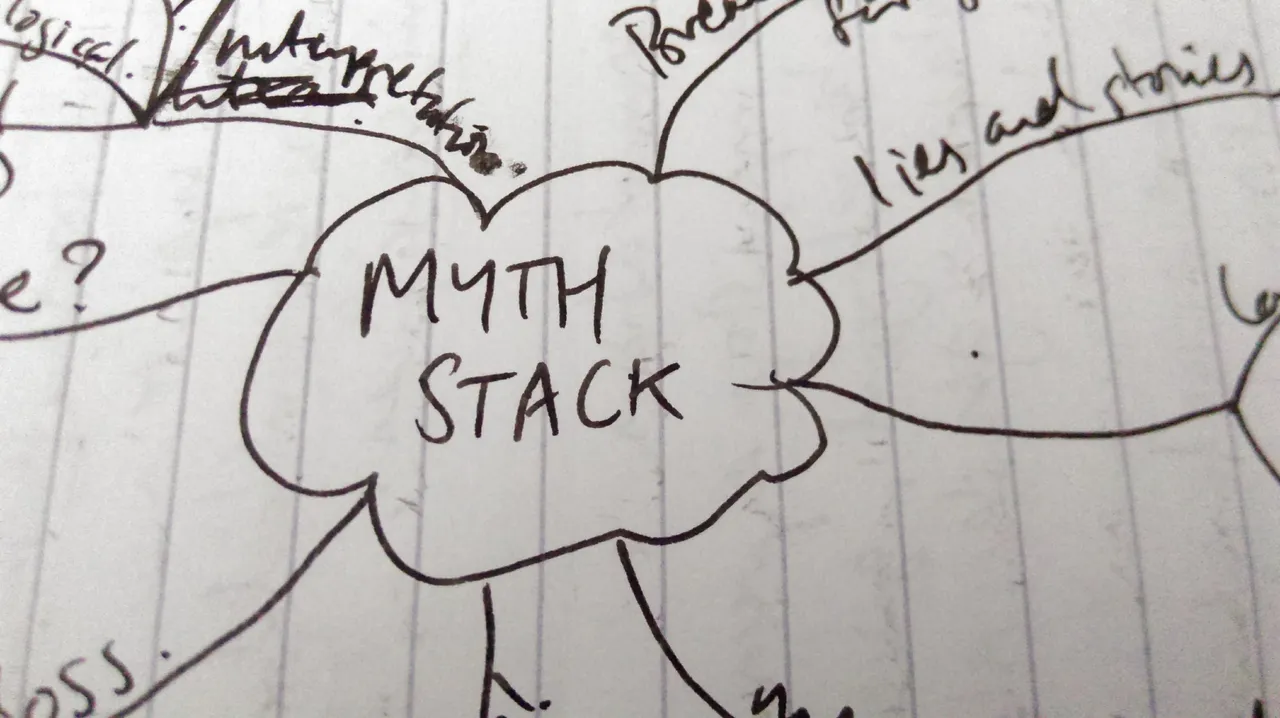
This started from an idea I had of layered intertwining stories. The first thing I noticed was that people coming to the session expected some sort of definition. What emerged out of me over a few iterations (and some people going away because I couldn't quite tell them in words they wanted to hear) was "The set of stories that help you make sense of your life and the world and how they are layered on top of each other". It's still not right (and that's great!).
It's interesting on reflection that people seemed to want a well-polished rendering of what this was about. They were interested, but couldn't quite discern what it was. That some left because it wasn't well-polished is ironic given that most of the stories we would talk about as making sense of the world have been polished over thousands or tens of thousands of years and I'd only come up with the term myself a few days before.
A relatively simple (hah!) example of a myth stack might be The Holy Bible (with all due respect to those who live by it's teachings - I understand that some people would find it hard to label the Gospels for example as myth because of the associations with paganism or that myth might mean "untrue" - but I'm using the term simply to mean stories that help you make sense of your life and the world). The stories in the Bible intertwine with each other and provide, for many people, a coherent set of principles to live by and a set of deep mysteries to ponder and reflect on in a way that is helpful when trying to live as good a life as possible.
So we talked about religious stacks, folk tale stacks, urban myths and fake news. We talked about different interpretations: the literal, the realistic, the rational, philosophical and psychological.
We observed that the most organic stacks are like lasagne - soft, rich, interdependent and good to chew over. Less organic stacks are like Jenga - if you pull out too many of the bottom layers, the whole thing topples over.
We looked at film representations - that many people's main experience of folk tales is now the Disney animated version; and the example of Schindler's List - a story that on the one hand is a very simple reminder of the horror of the Holocaust but also gives people an idol and can encourage thinking like "If I was in that situation, I'd save people too" when it's unlikely to be the case for everyone.
We talked a lot about false stories, lies and fake news, noting that they can have a layered structure themselves - this led us to a discussion of confirmation bias and how these structures can grow even though some layers might be obviously false, because they fit with an earlier, more general, but false, view of the world.
And this turned into a conversation about power and how stories can be used to control as well as liberate, noting that politicians have become creators of mythologies and adept at using these techniques to get what they want. Inevitably, given where we are now, the stories around Brexit were pulled out and dissected, including a suggestion that Nigel Farage saw himself as a kind of Perseus, presumably beheading the Gorgon European Union. Myths at Ten... Bong!
Also this was theatre people so we had to dip into both the old dressing room stories we grew up on, but also things like "theatre is a meritocracy" and "success comes from doing the things I did" - we could have gone on and on with this.
So yeah, there's so much more to say about lots of these and I'm glad I brought it out as something to talk about. It got confusing at times - someone did at one point think that I had said "there's the gnome, and the un-gnome" whereas I was talking about "the known and unknown".
And I got a recommendation, which I've just picked up, to read "King, Magician, Warrior, Lover" by Robert Moore & Doug Gillette, which also ties into the men growing up session that I called the previous day.